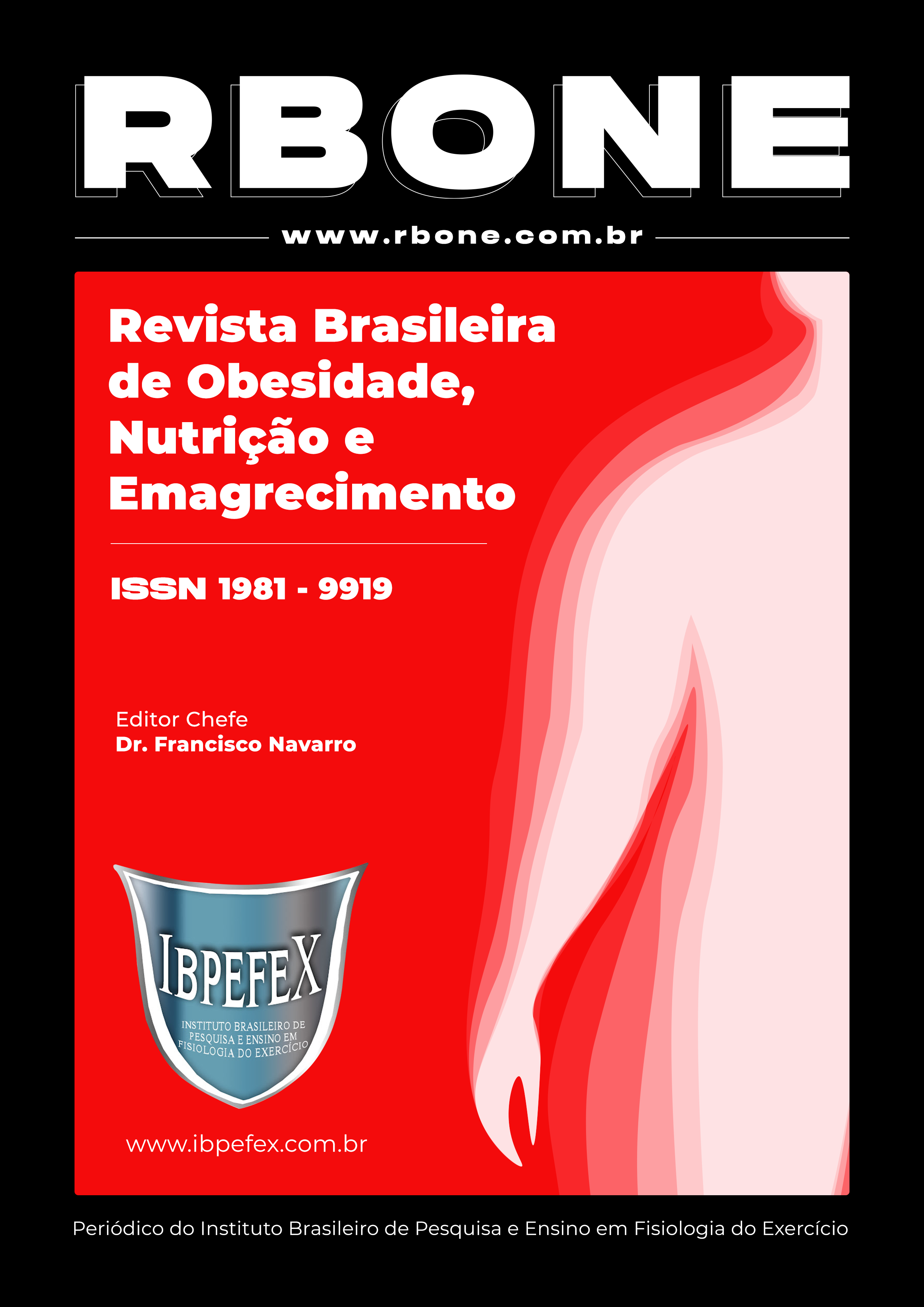Effects of nutritional interventions on eating behavior after bariatric surgery
Abstract
Four adult women with weight relapse and difficulty adhering to nutritional treatment participated. At baseline, sociodemographic, clinical history assessment and treatment adherence questionnaires were applied, in addition to the Beck anxiety inventory and the three dietary factors questionnaire. Intervention 1 (I1): Intervention with a conventional eating plan; Intervention 2 (I2): Intervention based on changing eating behavior. Better results were noticed in the short term with I2. I1 contributed to increasing or maintaining anxiety levels and the frequency of dysfunctional eating behaviors. However, regular long-term monitoring appears to be necessary to provide social reinforcement that motivates adherence behaviors to be maintained even in the absence of improvements in biological markers.
References
-Adami, G.F. Feeding Behavior and Body Mass Index. In: Preedy, V.R. editor. Handbook of behavior, food and nutrition. New York: Springer. 2011. p. 891-910. doi:10.1007/978-0-387-92271-3_59.
-Bellisle, F.; Dalix, A. Cognitive restraint can be offset by distraction, leading to increased meal intake in women. The American Journal of Clinical Nutrition. Num. 74. 2001. p. 197-200. doi: 10.1093/ajcn/74.2.197.
-Bandstein, M; Mwinyi, J.; Ernst, B.; Thurnheer, M.; Schultes. B.; Schioth, H. B. A genetic variant in proximity to the gene LYPLAL1 is associated with lower hunger feelings and increased weight loss following Roux-en-Y gastric bypass surgery. Scandinavian Journal of Gastroenterology. Vol. 51. Num. 9. 2016. p. 1050-1055. doi:10.3109/00365521.2016.1166 519.
-Busetto, L.; e colaboradores. Practical recommendations of the Obesity Management Task Force of the European Association for the Study of Obesity for the post-bariatric surgery medical management. Obesity Facts. Vol. 10. Num. 6. 2017. p. 597-632. doi: 10.1159/000 481825.
-Cambi, M.P.C.; Baretta, G.A.P. Guia alimentar bariátrico: modelo do prato para pacientes submetidos à cirurgia bariátrica. Arquivo Brasileiro de Cirurgia Digestiva. Vol. 31. Num. 2. 2018. p. e1375. doi: /10.1590/0102-672020180001e1375.
-Duarte, C.; Pinto-Gouveia, J.; Stubbs, R.J. Compassionate Attention and Regulation of Eating Behaviour: A pilot study of a brief low-intensity intervention for 70 binge eating. Clin Psychol Psychother. Vol. 24. Num. 6. 2017. p. O1437-O1447.
-Egan, S.J.; Watson, H.J.; Kane, R.T.; McEvoy, P.; Fursland, A.; Nathan, P.R. Anxiety as a Mediator Between Perfectionism and Eating Disorders. Cognitive Therapy and Research. Num. 37. 2013. p. 905-913. doi: 10.1007/s10608-012-9516-x
-Glisenti, K.; Strodl, E. Cognitive behavioral therapy and dialectical behavioral therapy for treating obese emotional eaters. Clinical Case Studies. Vol. 11. Num. 2. 2012. p. 71-88. doi: 10.1177/1534650112441701.
-Herman, C.P.; Polivy, J. A Boundary Model for the regulation of eating. In A. B. Stunkard & E. Stellar (Eds.), Eating and its disorders. 1984. p. 141-156. New York: Raven Press. doi: 10.3928/0048-5713-19831201-03.
-Leal, C.W.; Baldin, N. O impacto emocional da cirurgia bariátrica em pacientes com obesidade mórbida. Revista de Psiquiatria do Rio Grande do Sul. Vol. 29. Num. 3. 2007. p. 324-327. doi: 10.1590/S0101-81082007000300013.
-Lourenço, A.S. A. Ingestão de Alimentos como Mecanismo de Regulação da Ansiedade. Dissertação de mestrado. Universidade Lusófona de Humanidades e Tecnologias. Escola de Psicologia e Ciências da Vida. Lisboa. Portugal. 2016.
-Odom, J.; Zalesin, K.C.; Washington, T.L.; Miller, W.W.; Hakmeh, B.; Zaremba, D.L.; Altattan, M.; Balasubramaniam, M.; Gibbs, D. S.; Krause, K.R.; Chengelis, D.L.; Franklin, B. A.; McCullough, P.A. Behavioral predictors of weight regain after bariatric surgery. Obesity Surgery. Vol. 20. Num. 3. 2010. p. 349-56.
-Natacci, L.C.; Ferreira Júnior, M. The three factor eating questionnaire - R21: tradução para o português e aplicação em mulheres brasileiras. Revista de Nutrição. Vol. 24. Num. 3. 2011. p. 383-394. doi: 10.1590/S1415-52732011000300002
-Neufeld, C.B.; Moreira, C.A.M.; Xavier, G.S. Terapia Cognitivo Comportamental em Grupos de Emagrecimento: o relato de uma experiência. Psico. 2012. Vol. 43. Num. 1. 2012. p. 93-100.
-Novelli, I.R.; Fonseca, L.G.; Gomes, D.L.; Dutra, E.S.; Carvalho, K.M.B. Emotional eating behavior hinders body weight loss in women after Roux-en-Y gastric bypass surgery. Nutrition. Num. 49. 2018. p. 13-16, doi: 10.1016/j.nut.2017.11.017
-Polacow, V., Costa, A.C.; Figueiredo, M. Comer com atenção plena (mindful eating). Nutrição Comportamental. Manole. 2015.
-Puhl, R.M.; Heuer, C.A. The stigma of obesity a review and update. Obesity (Silver Spring). Vol. 17. Num. 5. 2009. p. 941-64. doi: 10.1038/oby.2008.636
-Sant’Anna, E.M.C. O impacto do Mindfulness na adesão ao tratamento para perda de peso em mulheres inférteis e portadoras de síndrome dos ovários policísticos com sobrepeso ou obesidade. Dissertação de mestrado. Belo Horizonte. Universidade Federal de Minas gerais. 2016.
-Scagliusi, F.B.; e colaboradores. Protocolo de terapia nutricional para pacientes com bulimia nervosa. In M.S. Alvarenga, F.B. Scagliusi, S.T. Philippi (Org.). Nutrição e transtornos alimentares: avaliação e tratamento. Barueri: Manole. 2011.
-Travado, L.; Pires, R.; Martins, V.; Ventura, C.; Cunha, S. Abordagem psicológica da obesidade mórbida: caracterização e apresentação do protocolo de avaliação psicológica. Análise Psicológica, Vol. 22. Num. 3. 2004. p. 533-550.
-Tribole, E.; Resch, E. Intuitive Eating. (3rd ed.). New York: St. Martin's Press. 2012.
Copyright (c) 2025 Amanda Chaves Marcuartú, Daniela Lopes Gomes, Silene Maria Araújo de Lima

This work is licensed under a Creative Commons Attribution-NonCommercial 4.0 International License.
Authors who publish in this journal agree to the following terms:
- Authors retain the copyright and grant the journal the right of first publication, with work simultaneously licensed under the Creative Commons Attribution License BY-NC which allows the sharing of the work with acknowledgment of the authorship of the work and initial publication in this journal.
- Authors are authorized to enter into additional contracts separately for non-exclusive distribution of the version of the work published in this journal (eg, publishing in institutional repository or book chapter), with acknowledgment of authorship and initial publication in this journal.
- Authors are allowed and encouraged to post and distribute their work online (eg, in institutional repositories or on their personal page) at any point before or during the editorial process, as this can bring about productive change as well as increase impact and impact. citation of published work (See The Effect of Free Access).






